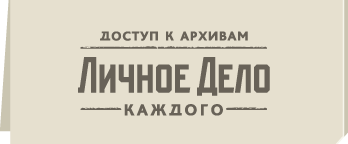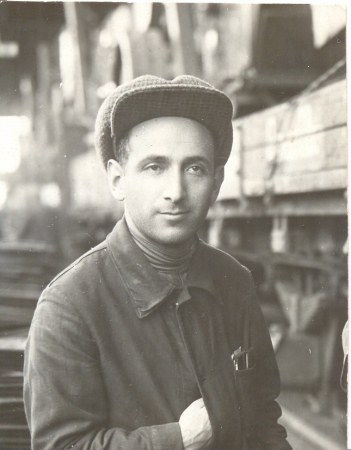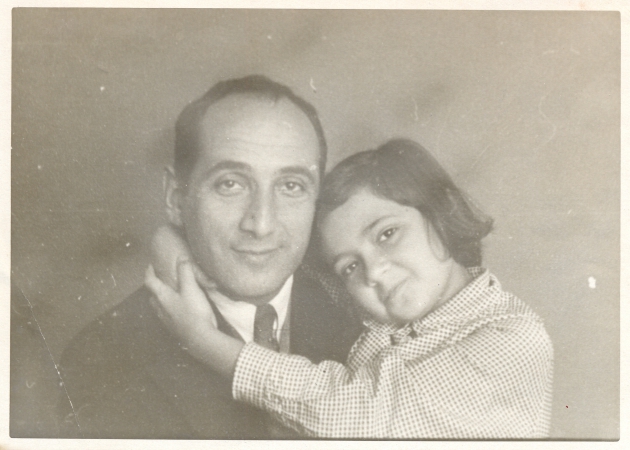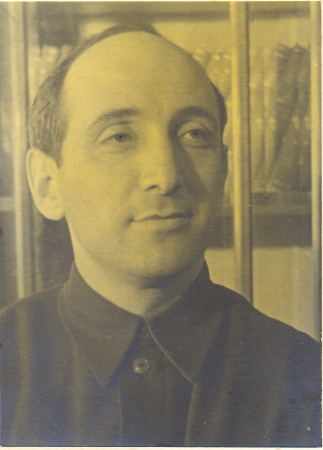Personal experience: Natalya and Ivan Shemanov
”I’m going to meet my close relative for the first time – and get there at the moment he’s dying”. The history of the arrest and repressing of David Kartashev, who became an object of speculations, guesses and arguments among his descendants.
The arrest
Natalya: The fact that my grandfather had been shot wasn’t hidden from me at home. Two of my other ancestors also served time, but they were let out and lived a normal, happy life after that. But for my grandfather David that was the end.
My grandfather was called David Kartashev. The last name he chose himself, at birth he was called David Mosel. He was born in Zaporizhia in 1902. In his file it says ”from bourgeois”, but I don’t know what that means in this particular case. He finished upper secondary school as well as two colleges – first economic and then mechanical engineering. After this he was working at Rostselmash.
Genetically grandfather David is especially close to me, he’s the father of my mother. I can’t say how old I was when I found out that he was shot during the Stalin repressions. But of course I was marked and carried a burden after facing the history of my grandfather. My mother usually didn’t tell me anything. It’s clear that it was hard to look back for her. She was nine years old when he was arrested. She was more likely to remember how she had to fill out all enquires with the information that her father had been repressed. He was rehabilitated in 1956, so she had to write that he had been repressed at the university as well as when getting a work placement. As I see it now, this really traumatized her.
My grandmother, his wife, remembered something but not much. Most of all within the framework of telling about her adolescence. I remember her telling me that my grandfather came to her riding on a horse after he had went to the Civil War.
Vanya: To me this was always a romantic history. This tickled my fantasy. If I have some sympathies for the bolsheviks it’s only because my grandfather had so. He is from the Jewish side of our family, from the problematic side, nonetheless since it’s Jewish. And he was a committed bolshevik. For me this was an important historic moment. In a family like that there are a few stereotypes that are constantly repeated, and it’s hard not to be influenced by them: ”Stalin was an assassin, but the old bolsheviks, they were good”. The idea of piety for the proletarians and disgust for the bourgeois. On top of this we have our own family legend (that isn’t verified), that he was accused of spying for Japan.
Natalya: In the end of the 1930’s he already lived in Moscow and was working in Glavselmash as the deputy manager. He was sent to work as a director in Rostelmash, but my grandmother was working in the administration here and didn’t want to leave. But anyhow, he was sent to Rostov-on-Don in January 1937 and in December he was arrested. And at my grandmother’s there was a rummage at this time – so she also knew, what had happened. She was afraid to go to Rostov-on-Don herself to clear things up. Her mother went there instead, but she was told that ”If the wife comes, we’ll tell her everything”. But my grandmother already had the experience of her sister, whose daughter Sima was left an orphan: first they arrested the father, and then the mother. My grandmother decided not to look for her husband, but to think about her daughter. A quite common case – formally she and her daughter weren’t registered. Maybe this played a part – sometimes things like that saved the wives from getting arrested. And then, somehow, the legend of my grandfather being arrested as a Japanese spy was born.
How to obtain documents
Natalya: I wrote to the Center for rehabilitation of victims of political repressions and archival information and said that I wanted to get acquainted with the archival file on my grandfather. I attached a certificate of rehabilitation and copies of documents that prove the consanguinity. They sent me an answer saying that the Ministry of Internal Affairs does not possess any information about my grandfather, and recommended me to turn to the central archive of the Federal Security Service of the Russian Federation FSB in Lubyanka, since the file of my grandfather most likely falls within their scope.
Except for this the people at Memorial told me that I need to write to the place where the letter of rehabilitation was sent from, where my grandfather was arrested. In our case – in Rostov-on-Don. I was given the address of the administration of FSB in the Rostov Oblast. I wrote them, and sent copies of all documents that prove the consanguinity. And after one and a half month I got the answer that the file already has been brought out, and that it will be possible to get acquainted with it within the nearest future.
After approximately another ten days I got another letter, sending me to a concrete specialist. I was talking on the phone with a woman who was in charge of this. She said that there’s no need to rush since the file was sent there for a period of three months. At an agreed time I went there with my son Vanya. The employee took us to a room where she gave us a folder to get familiarized with the file. She showed and explained everything to help us get somehow orientated immediately. A sound woman I would say, supportive. She sat close to us all the time and helped us get acquainted with the file as much as she could.
The file of my grandfather is in one volume, but there is also many volumes about other repressed people, that they didn’t show to us. And in our volume there were also some other documents – a decision by the court in 1956 regarding not only our grandfather but also others. In the end of the folder there were some closed pages, wrapped up with cardboard from both sides, fastened with thread. The employee immediately told us that that these documents that have been sewed together concern the time of the rehabilitations, and haven’t reached the age of 75 years yet.
The File
When I told my friends that I had written a letter and gotten an answer, and that I’m going to the archive to have a look, it became clear that each one of them has somebody in their family who was repressed, but none of them wants to go and read their files. The ones who want to have a look are usually outside relatives that don’t have any straight connection to the person – a husband, for example. But close relatives don’t go and look. For some people this is a big problem – to once again face this trauma that was passed on in their family. They don’t want to remember anything about this.
As I already said, I basically didn’t know anything about my grandfather. Not even any letters from him remain – it seems like they took everything during the rummage. The only thing remaining is a note that he sent from Rostov-on-Don to my Mom: ”Dear Musenka. I am very proud that you are an excellent pupil. I miss you a lot. I’m waiting for you and your mom to come see me. Your dad. Lots of kisses and hugs”. No details, nothing about what kind of person he is, nothing. Only photographs.
And now I’m going to meet my close relative for the first time – and get there at the moment he’s dying. You see the documents, all anonymous, where there is nothing, absolutely nothing. You constantly submerge in the year of 1937. You even start remembering what your grandmother told you about this time: about the atmosphere at her work, about how she went through the procedure of guardianship of my aunt, how they didn’t want to give her guardianship because her husband was repressed, and so on. You look at all of these archival documents and start tearing up.
Then I found a book about the events of the period of terror in Rostselmash and it turned out that 130 people were arrested within the same case. They were arrested within two or three years. Out of them almost 70 people were shot or put in jail. Many of them told on each other. It seems like there was a need to create some kind of spectacle, after which all the enemies of the people would be dead. It’s just not understandable why this had to be done. Some people back then considered that NKVD (People's Commissariat for Internal Affairs) was arresting fascists.
Vanya: It was all about sabotage in the whole administration. About the fact that a trotskyist organization had been founded there that absorbed them all, and the manager of the administration sent my great-grandfather to Rostselmash especially to sabotage, to put his own people on high positions and dismiss those who were good workers. It’s amazing stuff – I was blown away by the fact that they supposedly wanted to get the percent of rejected products to 100.
Natalya: There is this book – The Red Wheel uncovering the truth about Rostselmash by Veselnitsky. It turned out that Memorial has this book, so I got it from the library there. When I started working with the book I understood that people who were arrested and shot already in 1934 are included in the book. Everyone is included. My grandmother really liked Ordzhonikidze who was their supervisor – but he took his life when he realized what was going on in his department. Then they started accusing, prisoning and shooting everybody. During this period there were two directors and three changes of party officials in Rostselmash. Everyone was shot.
Vanya: We were arguing about what the file of my great-grandfather will be like, big or small. I think I was right – it was small. I actually thought it would be even smaller, that confessionary evidence wouldn’t take up that much space. But in reality they had nine or ten files of only my great-grandfather. There were also two protocols from the interrogation, and two from the face-to-face confrontation and from the so called judge. Other names also occurred in the file – it was evident that these were the same people, a common goal, that people talked about each other. Some of the names he dropped during his confession. As planned, this is all very impressive – name after name, chart after chart. It seems like you can’t randomly come up with something like that. It really is quite a well-knit and beautiful picture in some ways, the structure of this so called Trotsky organization.
Natalya: It is known that they were tortured. And the file was still big, more than 130 people were arrested. Out of those who were arrested in 1939 many survived. Afterwards they were telling about this: the file had been prepared in advance, and they were forced to sign it. Judging from the recollections they weren’t hit that much in Rostov. There they were tortured – they were interrogated all night and weren’t allowed to sleep during the days. But the interrogators that were connected to Moscow, as I understood, really beat them up.
Vanya: And then the investigators of this case were repressed. This became clear from the rehabilitation documents. Among the arguments for rehabilitation of people according to that list it had been observed that the investigators were corrupt, for which they got some kind of punishment.
Natalya: When I saw the file for the first time it was awful. Very heavy. But I think this is important for the descendants. One way or another, I met my grandfather. Vanya maybe didn’t meet him, but I did.
Vanya: I very much met him.
Natalya: The file, as from 1934, starts with the trotskyist organization. The first director they locked up in 1936 – I really feel for him, he took the hit, since the following ones already had some kind of understanding of what was going on, of what to expect. But he, most likely, didn’t understand anything. He was tortured and signed everything. In the cell he was in a state of desperation. He was crying in this cell – we know about this from the notes of a doctor, who came to him in the cell back then. The director cried and said that he was forced to sign a death sentence for both himself and others.
Vanya: There were interesting spots in the file of my great-grandfather. I don’t get what it is – realism or pseudorealism. The quotations in the file seemed to be of a person who somehow tries to justify himself. For me it’s still not very clear what that really is. For example, from a protocol of the interrogation: he (or not him, I don’t know) says that when he came to the factory the first thing he did was to put away saboteurs. And then the interrogator answers him: ” Yes, you started doing this, but only to disguise your own sabotaging activities”. And he answers: ”Yes, yes, you are completely right”. There is a certain stylistic adjusting there. This is what they were working with, in case this wasn’t real confessions. I don’t know to what degree, how the interrogation went exactly. Did they write everything beforehand, and then only let him sign? Or did he have to say out everything loud? And where were these spots taken from?
Natalya: Here, of course, you need to look at other files. When the author of these books was doing archival research and compared texts during the 90’s he wrote that all of the files were formalized. Sometimes they literally just used the same templates.
Vanya: Maybe this was a stylistic cliche that the superiors liked. To write that they were fighting sabotage. It’s hard to say if there is anything personal there.
Natalya: I got the impression that there is nothing personal there. Not even in the form. The only thing we found out is the date of his death. We found out the day of the execution – 3rd of July 1938.
His brother sent a request about the date of his death, and he was told a completely other date, half a year after the execution. Why they had to do that is not understandable. This was already after the rehabilitations. Veselnitsky writes about this in his book.
Such a ”meeting” with a relative doesn’t pass at first. In some ways, the situation gets even worse. You find out something from the materials, of course, but not much. Because of this, the material me and Vanya saw together caused an argument between us.
Vanya: Why did such a conflict even occur between me and my Mom? There is a moment of the trial of the provisional court, the Special troika. It lasted for 15 minutes. The main point was that one part of the people confessed, and the other didn’t. You could see this in the documents about the rehabilitations among others. This was one of the arguments for rehabilitation – refusing to confess. But my great-grandfather didn’t refuse to confess, although everything was false to the core. For me this created some kind of moral complexity, which I shared with my Mom. To tell the truth is somehow a matter of honor. I get that in the court they couldn’t torture him anymore. They were already blaming him, and this was the 15 minutes that would decide whether he would be sent to a camp or be executed. In our case he was executed. What’s the reason, why wouldn’t you deny your confessions in the last minute – for me this wasn’t understandable. There is a strange spot in the file: in the protocol of the court he ”asks to make up for his fault with blood”.
Natalya: That is, he asks to be shot.
Vanya: In the documents of the rehabilitations they make the following conclusion: ”Apparently, no trotskyist organization existed at the factory in Rostselmash” – a part of the prisoners denied their confessions, which is suspicious.
Natalya: I found a way to explain this to myself. It wasn’t only our grandfather who didn’t take back his confessions. Every person has his own truth when facing the death. Vanya says that they didn’t really know what would happen, that they could have taken back their confessions and maybe wouldn’t have been shot. I say, that on the party meetings that also my grandfather attended they asked for example: ”What to tell the workers about the executions?” To which the answer would be: ”There is no need to bring this up, but if they ask, tell them that those and those people have been executed”. That is, everyone knew everything. The wives were told the following phrase: ”10 years without any right to letter correspondence”, but it was already hanging thick in the air that many people had been shot. Therefor I think that my grandfather knew what was waiting him. He hung around these people.
Vanya: I don’t see why he should have known. He could have just been sent to a prison camp. From where would he have known this? This was decided inherently, flipping a coin.
Natalya: As Veselnitsky writes in his book: ”he already knew that he was a Trotskyist and was down in the moth”. I want to tell why I see the situation like this: why some people, like him, didn’t take back their confessions. Some people didn’t do it, because they were hoping for rescue, and asked to be sent to a prison camp. Or as the situation with Bukharin, whom they convinced that it was important for the party that he tells all of these things in an open process. We can’t know for sure, what was going on in these people’s minds. About my grandfather there are notes like this in the book:
”When I came here I thought that the director of NKVD would show me the places where sabotage had taken place and then I would take care of the consequences of the sabotage. But then I came here and was supposed to look for saboteurs. For me this was completely unexpected”.
Some workers that were removed by my grandfather in the process of personnel replacements were soon arrested by the NKVD. After realizing this he became more careful. On the party conference the first secretary of the kraal committee Evdokimov turned to him with a demand:
Evdokimov: ”You are the director of the factory and revealed one of the following saboteurs, right?”
Kartashev: ”Yes”
Evdokimov: ”Did you turn him in?”
Kartashev: ”No, I don’t turn people in. I revealed him, that’s enough”.
Evdokimov: ”You have both maps and hands. You find the border, where there is evil intentions and negligence, where there is a technical risk, but it’s impossible to do it without any technical risk. To clarify the border between sabotage and a technical risk is up to you. If this is clear, there will be less misunderstandings”.
Kartashev: ”To determine the border between bad work and sabotage you need time to puzzle this out”.
Evdokimov: ”Is three months enough? That’s more than one month”.
Kartashev: ”It’s a big number of people that we first fired, who then were locked up” (NKVD locked them up – from the hall)
Evdokimov: ”Lyushkov won’t find the material himself, he has your party organization, your Soviet people, engineers, that hint that everything isn’t ok there, and he starts looking, organizing the material: one was dashed off, and there was a chain of events. People ask why Lyushkov can do this, while we, party and economic executives, can’t? Before we tell Lyushkov, find and untangle something yourself. On the plenum of the Central Committee they also put it like that”.
When they chose delegates for the party plenum that is supposed to evaluate the work of others and also sign a sentence my grandfather refused. It was always after the plenums that the arrests happened. How I see this situation: David didn’t want to take part in the imprisoning. At first he tried to make things better, but then understood that there no one was trying to make things better – they were just arresting everyone in a row. He began to step away from this. The first psalm is about this: ”Blessed is the one who does not walk in step with the wicked or stand in the way that sinners take or sit in the company of mockers”. You just have to walk away.
It’s evident that he shared information with them. These were his colleagues once, but not anymore. During the Soviet era there were two books, two sets of behavior in situations like that: Vladimir Albrecht’s system and Solzhenitsyn’s ”don’t believe, don’t be afraid, don’t ask for anything”. Either a fight based on knowledge of legal codex, or, as Solzhenitsyn writes, ”not to communicate”. If you communicate they get information from you. My position: I step back and try not to make contact. I was thinking for a long time and understood that I am more like my grandfather. I can walk away though – my grandfather couldn’t, unfortunately. That court was not the place for a fight.
Vanya: There is a moment there, but just like before I can’t say whether it’s true or not, how truthful the protocol from the trial is. But everything is written on a typewriter. One font, another font – we aren’t specialists, and can’t analyze this. Only ”executed by” and the signature is written by hand. I think my great-grandfather was in despair. A person in despair can act like that. But for some reason my mom didn’t like this thought, that he was in despair. In my opinion that’s a good thing – to be in despair. At least there’s nothing bad about that.
And secondly – if this is a protocol, it should actually be the truth. Honor is definitely a medieval, old-fashioned concept. But to tell the truth in a situation when nothing depends on you anymore could be interpreted as a question of honor, simple honor. To lie is bad. This is strange to me. I can understand this only as despair. That a person in a situation like that can give a false testimony against himself, even when he’s under pressure, doesn’t deny everything. Before his inevitable destiny, before the face of death – if he not even then can take back his testimony – then it’s a moment of honor, that is important to me.
Of course, in the party of bolsheviks he was young. The bolsheviks were the punkers of that time, radicals. Not many wanted to support them. My great-grandfather was very young then, only 18 years old. He was a maximalist, some things he could reconsider afterwards. In a emotional and psychological way this is interesting and unusual to me.
Natalya: I asked Vanya: ”What do you think, how can a person who knows that he’s going to be shot behave in an honorable way under these circumstances?” And Vanya answered that you have to say: ”This is all false – do not shoot me”. I think there is not one right behavior when facing the death, especially when you are tortured, and those who you don’t consider to be enemies are killed.
The book cited:
Veselnitsky I. The Red Wheel uncovering the truth about Rostselmash: (A chronicle of the terror during the 30’s) / Rostov: Military Gazette from the south of Russia, 1999.





